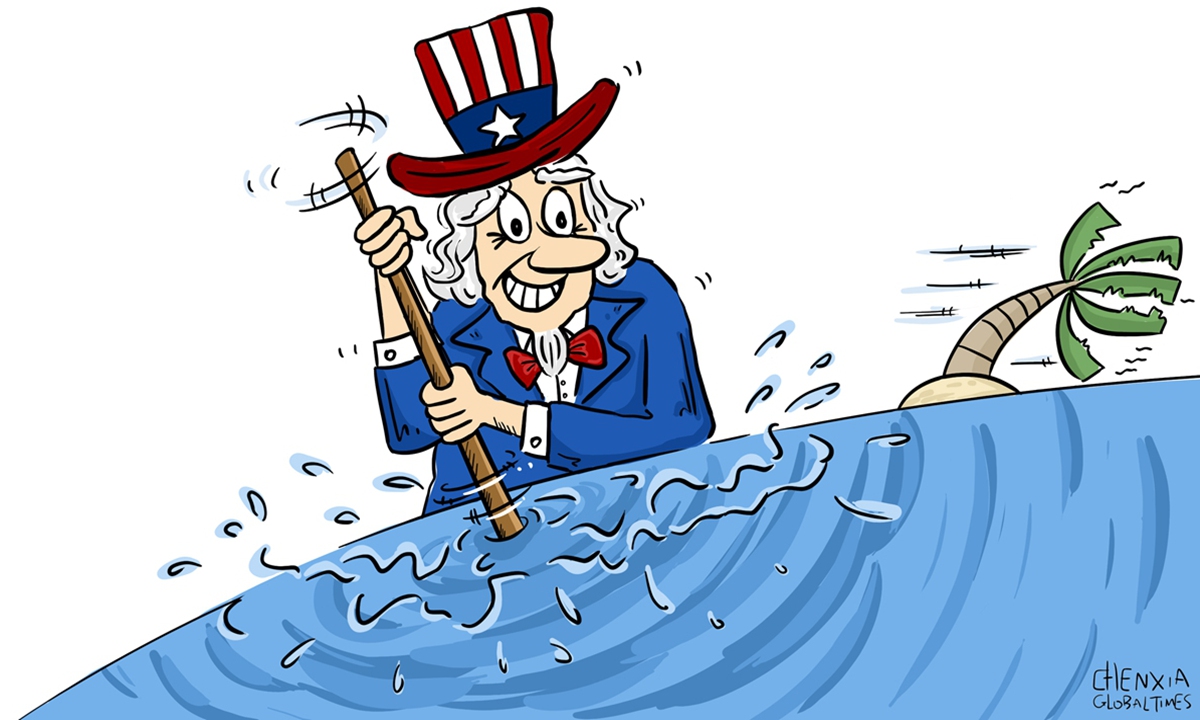
Illustration: Chen Xia/GT
US Vice President Kamala Harris is scheduled to leave Washington Friday for a planned visit to Singapore and Vietnam. According to Reuters earlier this month, a senior White House official said Harris will focus on defending international rules in the South China Sea, strengthening US regional leadership and expanding security cooperation during the trip.
Harris' Southeast Asia trip will be the third wave of diplomatic offensive by the Biden administration on the South China Sea issue within a period of less than two months. US Secretary of Defense Lloyd Austin paid a visit to Singapore, Vietnam and the Philippines from July 26 to 29. During the trip, he said Beijing's claim to the vast majority of the South China Sea has no basis in international law. Austin reiterated that the US would continue to support the region's coastal states in upholding their rights under international laws, and remain committed to its treaty obligations to the Philippines in the South China Sea.
All these practices indicate that the Biden administration is promoting its new South China Sea policy. Right now, the US is attempting to rope in the UK, Germany, Japan and Australia to construct a "small bloc" for the common goal of containing China.
The US' "minilateralist" attempts began fermenting during the Trump administration. It aims to unite its allies and partners to keep China firmly locked within the first island chain, with an attempt to maintain an overwhelming strength in the region.
Can Washington achieve its goal? US' allies and partners are a pivotal factor in determining whether its new South China Sea policy can succeed. But they are also the soft underbelly of the US.
First, to avoid being involved in China-US competition is a common desire shared by almost all ASEAN members. The US' statement that it is not asking Southeast Asian countries to choose between China and the US is clearly duplicity. The core of Washington's new South China Sea policy is to work with allies and partners, especially ASEAN countries, to counter Beijing's so-called expanded influence. But China and ASEAN countries understand that the South China Sea issue is not the whole of the relations between them. Most ASEAN members are reluctant to engage in a great power competition because of the South China Sea issue, which may impact their economic ties with China.
Second, the Philippines is the most important US ally in the South China Sea region. However, Philippine President Rodrigo Duterte doesn't want to irritate China under the new US strategy in the region. In Duterte's recent State of the Nation Address, he promised that the country would not close its doors on diplomacy and détente because, "that is how disputes are settled and never by force."
Last but not the least, the US is trying to use maritime disputes to drive a wedge in China-Vietnam relations. However, both Beijing and Hanoi have already reached a consensus on preventing the South China Sea issue from affecting the overall situation of bilateral relations. So the US can woo Vietnam through arms supplies, COVID-19 vaccines aid and economic cooperation. But apparently, it cannot damage the time-tested China-Vietnam relations.
In fact, even the staunchest US allies, for instance, NATO countries, don't want to worsen their relations with China because of South China Sea issue.
Currently, the situation in the South China Sea has entered a new stage of using rules to seek peace and order. By roping in non-regional and uniting regional countries, Washington is trying to gain dominance in making rules in the South China Sea region. But the system of rules based on the Code of Conduct in the South China Sea is not a tool to satisfy the selfish desire of a hegemonic power. It is a necessity for the long-term stability of the region. The US should have given up such an outdated and conservative mentality long ago. It should play a constructive role in the peace and stability of the South China Sea.
In addition, some countries should have a clear understanding of the self-serving nature of Washington's new South China Sea policy. They should focus on maintaining a safe and stable environment for the South China Sea.
The author is director of Research Center for World Navy at National Institute for South China Sea Studies. opinion@globaltimes.com.cn




